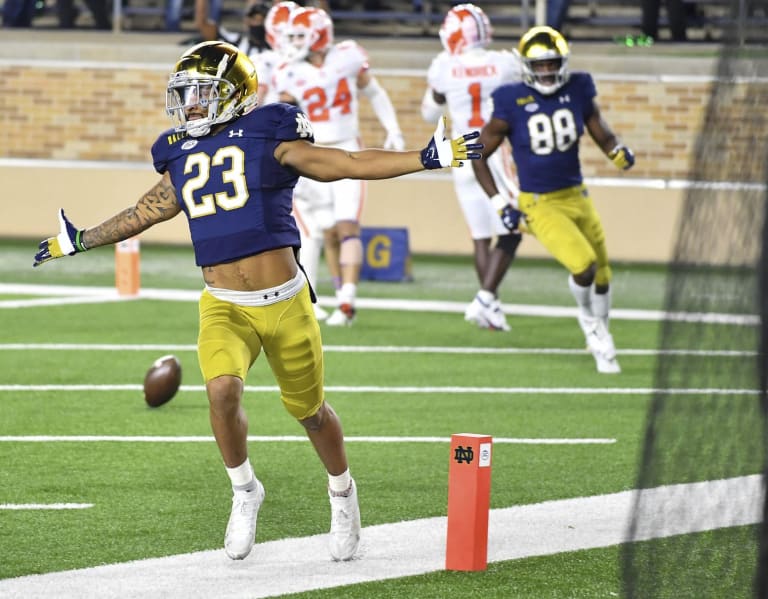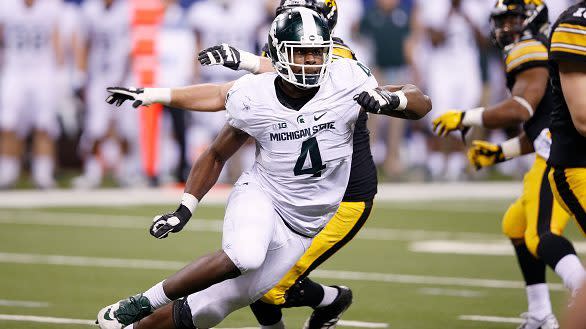No march toward the national title can be achieved without some surprises along the way, either individually or among a position group(s).
• During Notre Dame’s 12-0 regular season in 2018, the Fighting Irish had to replace two top-10 NFL picks along the line, the leading rusher (plus the top returning one was suspended the first four games), leading receiver, and then lost the best returning o-lineman (captain Alex Bars) in the fifth game — after also making a quarterback change.
• In 2012, the defense graduated its two starting corners, a first-round safety in Harrison Smith, the starting nickel, and had a season-ending injury to another starting safety early in game three (Jamoris Slaughter) — plus Freshman All-American lineman Aaron Lynch transferred.
Yet despite five straight seasons with at least five losses, that defense would be Notre Dame’s best in 32 years. (And we’re not even including all-time receiving leader Michael Floyd also graduating).
• The 1993 edition that finished a controversial No. 2 had graduated the backfield of top-10 picks Rick Mirer and Jerome Bettis plus second-round selection Reggie Brooks (5th in the Heisman balloting) — yet still didn’t miss a beat with the less heralded trio of Kevin McDougal, Ray Zellars and Lee Becton.
• The most recent such title winner at Notre Dame in 1988 not only had to replace Heisman Trophy winner Tim Brown, but also the entire starting offensive and defensive lines.
And so here we are in 2020, and for the third time in the last eight years, head coach Brian Kelly’s Fighting Irish are making a serious bid to compete for the national title.
It’s inevitable that some “surprises” had to occur, but where have the biggest ones been? Defensive backfield, running back, receiver? We offer the following point-counterpoint on “which position group has been the bigger surprise during No. 2-ranked Notre Dame’s 8-0 start?”
Point: Running Backs The Easy Answer
By Todd D. Burlage
Each summer before Notre Dame opens its fall football camp, all of us at Blue & Gold Illustrated fill out a questionnaire to make some preseason predictions. As part of that assignment this year, I chose Irish senior running back Jafar Armstrong as my breakout player for 2020.
I based my misguided pick on the fact that senior running backs have flourished under Kelly, Armstrong was the only returning one with significant career experience, and we knew nothing or very little about sophomore Kyren Williams, freshman Chris Tyree and junior C’Bo Flemister as the trio of relatively anonymous and unproven figures behind Armstrong.
Now, eight games into this season, we’ve learned plenty about Williams while he has become one of only five running backs in the ACC averaging more than 100 rushing yards per game. Meanwhile, Tyree and Flemister have also emerged as solid backups behind Williams — inspiring the move of Armstrong to wide receiver — and the 2020 Irish are one of only four ACC teams this season averaging more than 200 rushing yards per game.
Additionally, Notre Dame’s 233.5-yard rushing average through eight games rates as the program’s second most productive ground attack since 1996, the last season Lou Holtz was Irish skipper.
Several position groups for Notre Dame have overachieved and out-performed expectations this season.
But for a group of running backs who entered this season lacking experience, reliability, hype, production and name recognition, to become the cornerstone of the Irish offense clearly makes this unit the most surprising of any on the team.
Counterpoint: The Wideout Corps Has Overcome More
By Lou Somogyi
Hands down, sophomore running back Williams indeed has been Notre Dame’s No. 1 individual breakthrough, most improved or top surprise.
From a collective standpoint, though, the receiving corps has emerged far more than expected.
Running back in 2020 still returned past big-game production with the senior Armstrong and junior Flemister (second in rushing TDs last year with five) to augment top-100 freshman Tyree, who was expected to be a factor right away (and has been). Williams’ quantum leap from last season has complemented the effectiveness of a veteran offensive line the Irish were expected to lean on heavily in 2020. However, look at three factors at wide receiver.
One, quarterback Ian Book lost his two prime targets from the past two years in Chase Claypool (116 catches in 2018-19) and Chris Finke (90 catches in 2018-19).
Two, the expected starting rotation in 2020 with juniors Kevin Austin (boundary), Braden Lenzy (field) and Lawrence Keys III (slot) has been mostly out of commission with health-related issues. Through eight games, they combined for eight catches for 85 yards, with Austin sidelined after foot surgery. A fourth wideout, grad transfer Ben Skowronek, suffered a hamstring injury in the opener that shelved him through the first month.
Finally, after the 12-7 win versus Louisville on Oct. 17, the wideouts were classified as the Achilles heel of the team with just 70 yards in receptions in that game and the lamentation about how there is a lack of speed and separation skills there that is preventing Notre Dame from being a bona fide contender.
Voila! In the conquest of No. 1 Clemson, the trio of Javon McKinley, Skowronek and Avery Davis combined for 13 clutch grabs for 213 yards. A week later at Boston College they had 181 yards on 12 grabs. Their downfield blocking, particularly McKinley’s, has also been a huge boon to the improved running attack.
No position group has overcome more and emerged better collectively, especially when most needed, than wideout.
—-
• Talk about it inside Rockne’s Roundtable.
• Learn more about our print and digital publication, Blue & Gold Illustrated.
• Watch our videos and subscribe to our YouTube channel.
• Sign up for Blue & Gold’s news alerts and daily newsletter.
• Subscribe to our podcast on Apple Podcasts.
• Follow us on Twitter: @BGINews, @BGI_LouSomogyi, @Rivals_Singer, @PatrickEngel_, @MasonPlummer_ and @AndrewMentock.
• Like us on Facebook.










